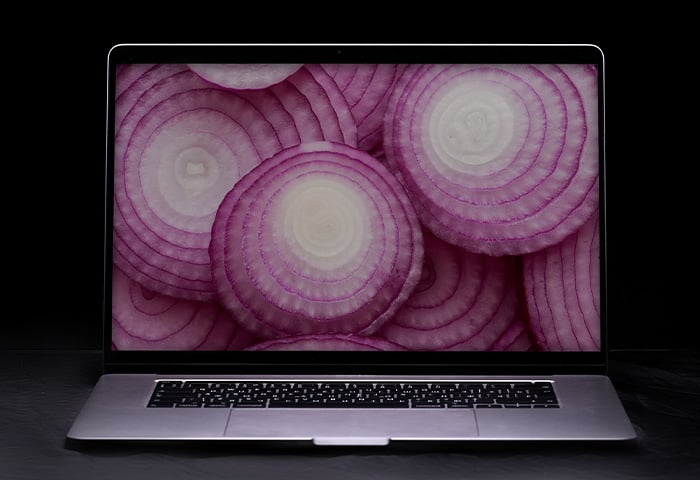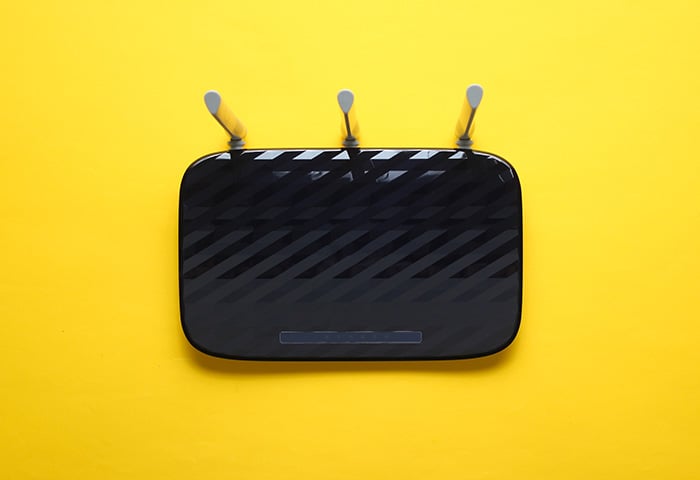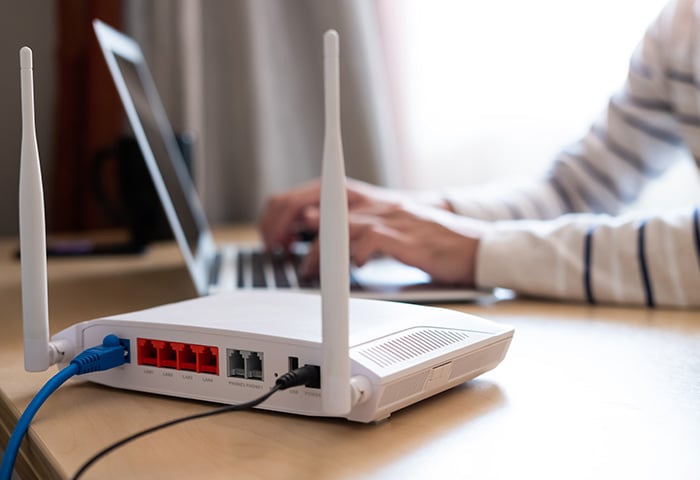What does streaming mean?
Streaming means sending and receiving data in a continuous flow over a computer network, from a remote server to your device. Online streaming allows content playback to begin even while the rest of the data is still being sent to your device.
When you stream content son the internet, as soon as your computer or phone starts receiving the data, you can start watching the TV show, movie, or whatever else you’re streaming. As the video or audio content continues playing, the rest of the data gets transmitted to your device gradually. When you stream, you can start consuming content immediately, without having to wait to download the entire file.
Streaming is commonly used for audio, video, and games. As long as you have a reliable internet connection, your device can play the entire movie or TV show smoothly without interruption. Any time you’ve used music services like Spotify or Apple Music, video players like YouTube or Netflix, apps like Twitch, or certain types of online games, that’s streaming in action.
How does streaming work?
Streaming works by breaking down content (like a movie) into smaller pieces or data packets. These data packets get sent to your browser, where the video player interprets the data as a movie. As soon as your browser has enough data packets to begin, the movie starts playing.
Most streaming sites use standardized TCP/IP layers (transmission control protocol/internet protocol) vs UDP (user datagram protocol) to transmit content from a server to a device. TCP/IP is more reliable for getting data packets where they need to go, and in the right order. But, streaming sites that rely on UDP usually offer faster transfers. Netflix, Amazon Prime, and Spotify use TCP, while YouTube uses a combination of TCP and UDP.
Companies providing content for streaming also need servers or cloud platforms for storage. Big players like Netflix have content delivery networks that keep the most popular content cached and geographically close to where it will be streamed. This reduces latency and bandwidth costs and makes it easier for you to watch TV online.
To ensure that streaming works for you, a reliable internet connection with sufficient speed is a must. It’ll need to be at least 2 Mbps (megabits per second) to provide a good streaming experience with no delays or reductions in quality. If your connection is too slow, you’ll constantly see pauses while your device is buffering. If you want to watch in HD or 4K, you should have an even faster connection of at least 5 Mbps.
 Streaming lets you watch shows online without having to wait to download an entire file.
Streaming lets you watch shows online without having to wait to download an entire file.
How does streaming differ from downloading?
The difference between streaming and downloading is that when you download a movie or song, the entire file gets saved on your device. When the download has finished, you can begin watching or listening. By contrast, the definition of streaming is that you can play media without downloading a file.
The main benefits of downloading are that you won’t face buffering issues and you can save your favorite content. However, if you download all your content — especially large media files (such as HD movies) — you’ll quickly fill up all of your available hard drive space.
While streaming can sometimes be difficult if you have a slow internet connection, it means content never takes up space. And with the plethora of streaming options available — music services like Spotify and Apple Music; video players like YouTube, Netflix, Hulu, and HBO Max; social streaming platforms like Twitch; and many games and apps — streaming has become easier than ever.
What is buffering?
Buffering is when audio or visual data is pre-loaded into the media player’s memory reserve (buffer) when you’re streaming content online. Buffering ensures that if there’s a brief interruption in your connection, you’ll still be able to stream the data that’s already been collected in the buffer.
However, when your internet connection is too slow, your player can get stuck buffering — meaning you’ve already streamed the content that was pre-collected. You may have to wait for several seconds or minutes before enough content has built up again in the buffer for playback to resume.
Which types of content can be streamed?
You can stream lots of content online. Audio and video are the most traditional forms of streaming — including music, podcasts, TV shows, books, and movies. Increasingly, you can also stream different types of games and live events via mobile apps, browsers, and other media players.
 Music and other audio
Music and other audio
Audio streaming, including both music and podcasts, has become incredibly popular. Music streaming services let you play tons of songs by different artists, all without having to download a single file.
Streaming services like Spotify, Pandora, and Apple Music provide millions of tracks available for streaming at the touch of a button. On music streaming sites like Pandora, you can select a genre or mood, and they’ll curate playlists for you. Others, like Spotify, play exactly what you select — though playlists are also a major component of the platform. Apple Music offers a mix of both options.
Podcasts can be either streamed or downloaded to listen to later, and they’re available through services like iTunes, Stitcher, and Audible. You can also stream audio files you own to other devices (such as directing your phone to play audio files via your Bluetooth speaker) within your home.
 Video
Video
Video was the first mass streaming hit, starting with services like YouTube. Instead of having to download large multimedia files, video streaming involves compressing the data into small packets and sending them to your device where they’re decompressed and displayed.
During a streaming session, the video is constantly buffering — while you’re viewing one packet of data, the next packet is decompressing so you can view the whole movie or TV show without interruption.
Some of the most popular video streaming services today are YouTube, Netflix, HBO Max, Amazon Prime, Hulu, Google Play, and Disney+.
Video streaming saves you a lot of time and hassle. Instead of downloading large files, which would occupy a lot of storage space on your device, you can watch whatever you want without having to store anything.
However, you may have problems if you try to stream your favorite content from abroad. Many sites are geo-blocked, meaning they restrict certain content to certain areas. If you’re traveling and want to access your favorite content from back home, you can still do so, but you’ll have to use a VPN .
 A VPN sends your internet traffic through an encrypted tunnel.
A VPN sends your internet traffic through an encrypted tunnel.
A VPN encrypts your connection and lets you hide your IP address and choose where you want your device to appear to be located. This allows you to set your location in a different country, successfully bypassing geo-restrictions and other content blocks. Have a trip coming up? Download AVG Secure VPN to encrypt your connection on the go.
 Games and apps
Games and apps
Game streaming, or cloud gaming, works like audio and video streaming. It saves space and reduces processing demands on your device by offloading them to a company’s gaming server.
When you game stream, you’re essentially sending commands over to a more powerful computer that executes them and streams the results back to your device. Only recently have internet speeds increased enough to make this process feasible in real time.
Apple now has some games that include only their core functionality in a download, and then they stream new levels or other content as users need it via a process called on-demand resources. Similarly, Xbox Cloud Gaming is a game streaming service that allows you to use any device that can access a browser to play video games — no discs, downloads, or consoles required.
Other services for streaming games and apps are in development. And depending on your needs, there may be some benefits to gaming with a VPN, whether you’re playing GTA 5 or any other demanding game.
What is live streaming and how does it work?
Live streaming works similarly to streaming other types of content, but live streaming is used for special events like sporting events, concerts, or political debates. As you watch, the stream temporarily stores and displays small amounts of data on your device, then discards them as you continue.
When watching a live stream, you visit a website (such as a news or sports site) that’s hosted on a web server. That web server connects to a media server, which beams the content to your device using a real-time protocol (RTP) and a real-time streaming protocol (RTSP). Those protocols allow video files to be sent in a smaller (compressed) form and then viewed in a higher quality (decompressed) form on your device.
Like any type of streaming, when you watch a live stream, you never receive an actual file — you get only the parts needed to deliver your live viewing experience at any given time. Social media platforms now offer live streaming elements, such as Facebook Live and Instagram Live.
Why should I stream content?
Streaming is super convenient in almost every way. Here are some of the main benefits of streaming content:
 Get instant playback: No need to wait for content to download. Streaming lets you start watching or listening almost immediately.
Get instant playback: No need to wait for content to download. Streaming lets you start watching or listening almost immediately.
 Avoid high costs and piracy: It’s expensive to buy a CD or digital download from every band you like. And downloading copyrighted content from torrent sites is illegal. For a small monthly fee to a streaming service, you can access all the content you want.
Avoid high costs and piracy: It’s expensive to buy a CD or digital download from every band you like. And downloading copyrighted content from torrent sites is illegal. For a small monthly fee to a streaming service, you can access all the content you want.
 Save space: Unlike downloading, streaming doesn’t store large files on your device. You get access to tons of music and movies without filling up your hard drive.
Save space: Unlike downloading, streaming doesn’t store large files on your device. You get access to tons of music and movies without filling up your hard drive.
 Access live content: Want to watch important live events like political debates, big sports games, or even Eurovision, but you don’t have a TV? Live streaming gives you access through your laptop or other devices.
Access live content: Want to watch important live events like political debates, big sports games, or even Eurovision, but you don’t have a TV? Live streaming gives you access through your laptop or other devices.
 Access content from abroad: Are you traveling abroad but still want to watch your favorite TV shows from back home? One of the benefits of a VPN is that you can change your IP address to stream your favorite content from your home country on the go.
Access content from abroad: Are you traveling abroad but still want to watch your favorite TV shows from back home? One of the benefits of a VPN is that you can change your IP address to stream your favorite content from your home country on the go.
How to improve your streaming experience
Struggling to stream your favorite content? Here are some ways you can improve streaming on your computer, phone, or another device:
-
Boost your Wi-Fi: You need a fast enough internet connection to properly stream. Try boosting your home Wi-Fi signal strength to improve streaming speed.
-
Reduce buffering: Internet speed may not be the only factor causing buffering. See our tips to reduce buffering while streaming.
-
Unblock streaming options: Are you traveling abroad and find that your normal streaming options are blocked in your current location? Use a VPN to unblock the websites you want to stream from.
-
Prevent ISP throttling: Your ISP (internet service provider) can limit your internet speed if they notice you’re using a lot of bandwidth. Use a VPN to help prevent ISP throttling and stream as much as you want.
-
Protect yourself while streaming on public Wi-Fi: While catching up on shows might seem like a great way to spend your airport layover, there are some risks to using public Wi-Fi. Use a VPN to protect yourself while streaming on public Wi-Fi.
-
Clean up your device: Your computer may struggle to stream if it’s bogged down with junk files and other digital leftovers. Try cleaning up your PC or speeding up your Mac for better all-round performance.
-
Make sure you have enough memory: Without sufficient RAM (random access memory), your computer may struggle to stream if you’re using a bunch of other apps at the same time. In rare cases, you may even need to upgrade your RAM for better streaming performance.
-
Optimize your PC for gaming: Whether you want to stream games or play games online, it’s always a good idea to boost your gaming rig for optimal gameplay.
Are there any downsides to streaming?
One potential downside to streaming is that it relies on a fast, stable internet connection. If you don’t have a good internet connection — or sufficient bandwidth — streaming will be difficult. Your media may pause or stutter while it attempts to finish buffering, which can interrupt your viewing or listening experience.
Depending on the streaming service you’re using, the quality may also be inconsistent. If your internet is unstable, you may find that a TV show starts and stops, looks blurry, or the picture and sound are out of sync. If you’re used to high-quality Blu-Rays, you’ll notice a drop in quality. But as long as you have good internet, streaming should work well.
With so many streaming services offering their own proprietary content, you can rack up costs pretty quickly with multiple concurrent subscriptions. You may also feel concerned about online tracking, data collection, and the amount of personal information you leak that can be picked up by companies interested in knowing your listening and viewing preferences.
Streaming services have also come under fire from artists who claim that the platforms make it harder for them to get appropriately compensated for their work. Tidal, the music streaming platform owned by Jay-Z, is one service attempting to give artists a fairer share of the proceeds earned from streaming.
Are there security risks of streaming?
There are some security risks with streaming, especially when using streaming sites that aren’t reputable. While the big names like Netflix and Spotify are secure, there are plenty of shady streaming sites out there.
How can you tell if you land on an unsafe streaming website? If the site isn’t well known but somehow offers a wide range of popular movies and TV shows, it may be streaming them illegally (aka pirating). If the site has the most current titles — like movies that are still in theaters — they’re likely pirated.
Another red flag is if tons of ads bombard your device as soon as you visit the streaming site. These ads can be laced with malicious software, which can infect your device as soon as they pop up. Try using an ad blocker to prevent these ads from loading.
If you’re not sure if a site is legitimate, it’s a good idea to search “[streaming site] + reviews” or “is [streaming site] legitimate.” You should also look out for other telltale signs of unsafe websites. And make sure to protect yourself from malicious downloads, viruses, and other malware with a strong virus scanner and malware removal tool.
Stay safe and anonymous while streaming
Just because you’re not downloading files to your device when you stream doesn’t mean there aren’t any risks. As mentioned above, it’s important to make sure that you’re using a legitimate site that has licensed its content appropriately.
Moreover, you can use a VPN to encrypt your connection to keep you private online. VPNs let you easily change your (virtual) location, which can prevent streaming services and advertisers from targeting you based on where you are.
 Using a VPN while streaming lets you access content that may not be available in your location.
Using a VPN while streaming lets you access content that may not be available in your location.
Whether you’re traveling abroad and want to access shows from back home or just want to stay safe on public Wi-Fi, AVG Secure VPN will keep your online activities secure and private.
%20-%20refresh/Signal-What-is-streaming-Hero-refresh.jpg?width=1200&name=Signal-What-is-streaming-Hero-refresh.jpg)
 Streaming lets you watch shows online without having to wait to download an entire file.
Streaming lets you watch shows online without having to wait to download an entire file. A VPN sends your internet traffic through an encrypted tunnel.
A VPN sends your internet traffic through an encrypted tunnel. Using a VPN while streaming lets you access content that may not be available in your location.
Using a VPN while streaming lets you access content that may not be available in your location.













